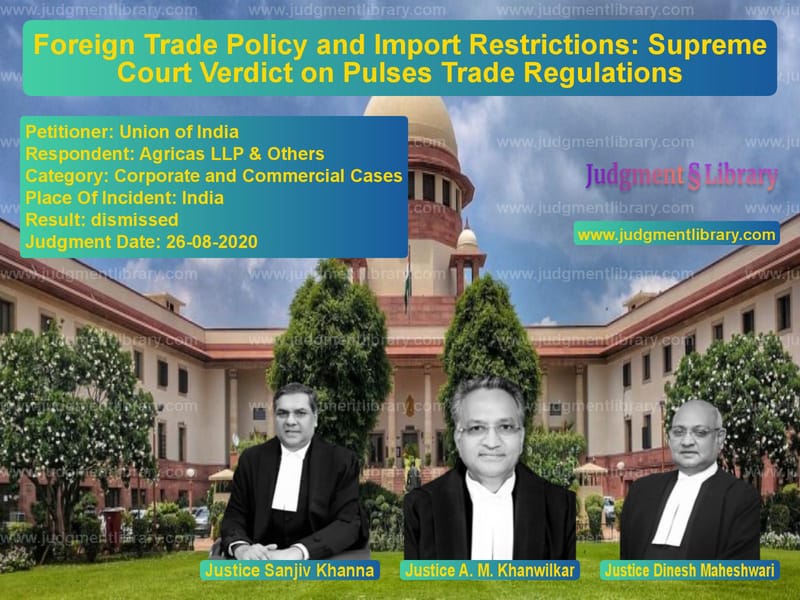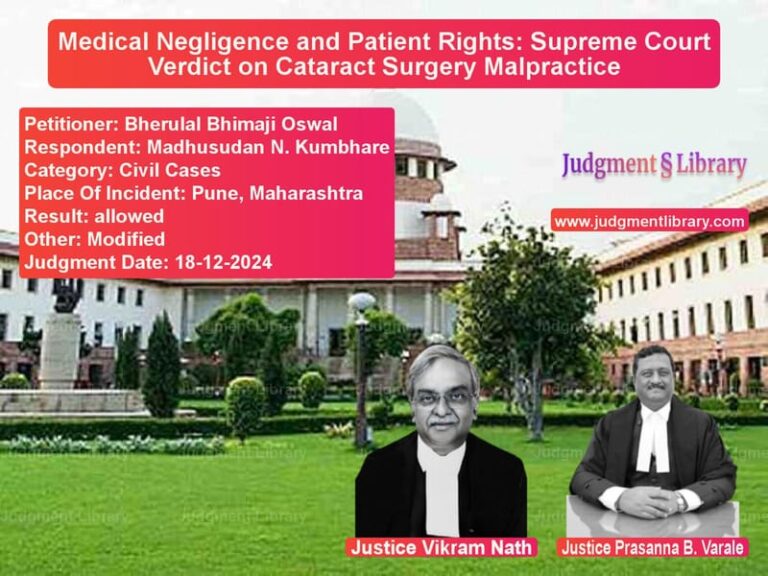Foreign Trade Policy and Import Restrictions: Supreme Court Verdict on Pulses Trade Regulations
The Supreme Court of India, in its judgment dated August 26, 2020, examined the legal validity of trade restrictions imposed by the Union of India through notifications under the Foreign Trade (Development and Regulation) Act, 1992 (FTDR Act). The case revolved around the restriction of imports of pulses, specifically peas, moong, urad, and pigeon peas, under government notifications issued in 2019. The petitioners, importers of these commodities, challenged the restrictions on the ground that they violated trade rights and were imposed without proper adherence to the statutory framework.
The core issue in this case was whether the notifications issued by the government under Section 3 of the FTDR Act, which restricted the import of pulses, were legal or if such restrictions could only be imposed under Section 9A, which deals with quantitative restrictions.
Background of the Case
The Union of India issued a series of notifications on March 29, 2019, restricting the import of various pulses, including peas, moong, and urad, by setting annual import quotas. The notifications were challenged in various High Courts by importers who argued that the restrictions were arbitrary and imposed without following due process.
The main contentions of the importers were:
- The restrictions violated their right to trade and were not imposed through proper legal procedures.
- The restrictions amounted to quantitative restrictions, which can only be imposed under Section 9A of the FTDR Act, requiring an investigation and adherence to prescribed procedures.
- The notifications were contrary to India’s obligations under the General Agreement on Tariffs and Trade (GATT) and the World Trade Organization (WTO) agreements.
Petitioners’ Arguments
The importers, represented by various trade associations, contended that:
- The notifications restricting imports were a form of “quantitative restrictions” under Section 9A of the FTDR Act.
- Section 9A required an inquiry to establish that the imports were causing or threatening serious injury to domestic industries before any restrictions could be imposed.
- The government did not conduct any such inquiry or follow the prescribed procedures before issuing the notifications.
- The restrictions violated GATT Article XI, which prohibits quantitative restrictions except under special circumstances.
- High Courts had earlier ruled in favor of importers, allowing them to continue their trade, and the Supreme Court should uphold those rulings.
Respondents’ Arguments (Union of India)
The Union of India defended the restrictions, arguing that:
- The restrictions were imposed under Section 3 of the FTDR Act, which grants the government broad powers to regulate trade.
- The government had the right to impose restrictions in order to protect domestic farmers and prevent a crash in pulse prices.
- The restrictions were temporary measures meant to balance trade and safeguard the agricultural sector.
- There was no need to follow the procedures under Section 9A since the restrictions were imposed under Section 3, which provides a separate legal basis for trade regulation.
Supreme Court’s Observations
The Supreme Court analyzed the case in light of the provisions of the FTDR Act, GATT agreements, and previous judgments. The key observations were:
- Section 3 of the FTDR Act grants the government broad powers to regulate trade, including the imposition of restrictions.
- Section 9A deals with “quantitative restrictions” that require a specific process, including an inquiry to determine injury to domestic industries.
- The impugned notifications did not fall under Section 9A but were legally valid under Section 3.
- The notifications were a policy decision of the government, and courts should not interfere with economic policy decisions unless they are unconstitutional or arbitrary.
- The importers were aware of the restrictions and could not claim violation of trade rights when the restrictions were imposed to protect the larger public interest.
Final Verdict
The Supreme Court upheld the validity of the government notifications and ruled that:
- The restrictions were legally imposed under Section 3 of the FTDR Act.
- The argument that the restrictions required adherence to Section 9A was incorrect, as Section 3 independently grants power to impose such restrictions.
- The importers could not claim any vested right to unrestricted trade, especially when the restrictions were imposed in the national interest.
- The High Court orders that allowed continued imports in defiance of government notifications were set aside.
Impact of the Judgment
The ruling has significant implications for India’s foreign trade policy:
- It affirms the government’s authority to regulate trade under Section 3 of the FTDR Act without being bound by the procedural requirements of Section 9A.
- It establishes that trade restrictions can be imposed for protecting domestic industries, even if they are challenged under WTO agreements.
- It provides clarity on the scope of government powers in trade regulation, balancing economic interests with public policy considerations.
- It reinforces that courts should not interfere in economic policy decisions unless they are unconstitutional.
By upholding the trade restrictions, the Supreme Court has set a precedent on the extent of government powers in regulating foreign trade while ensuring that policy decisions are not easily challenged by vested interests.
Petitioner Name: Union of India.Respondent Name: Agricas LLP & Others.Judgment By: Justice Sanjiv Khanna, Justice A. M. Khanwilkar, Justice Dinesh Maheshwari.Place Of Incident: India.Judgment Date: 26-08-2020.
Don’t miss out on the full details! Download the complete judgment in PDF format below and gain valuable insights instantly!
Download Judgment: Union of India vs Agricas LLP & Others Supreme Court of India Judgment Dated 26-08-2020.pdf
Direct Downlaod Judgment: Direct downlaod this Judgment
See all petitions in unfair trade practices
See all petitions in Legislative Powers
See all petitions in Public Interest Litigation
See all petitions in Judgment by Sanjiv Khanna
See all petitions in Judgment by A M Khanwilkar
See all petitions in Judgment by Dinesh Maheshwari
See all petitions in dismissed
See all petitions in supreme court of India judgments August 2020
See all petitions in 2020 judgments
See all posts in Corporate and Commercial Cases Category
See all allowed petitions in Corporate and Commercial Cases Category
See all Dismissed petitions in Corporate and Commercial Cases Category
See all partially allowed petitions in Corporate and Commercial Cases Category







